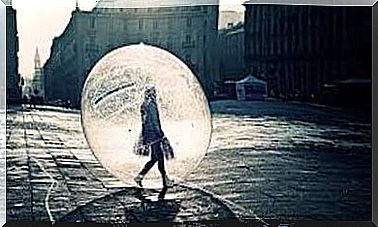The Existential Bubble That Limits Us

We all live in an existential bubble in which various restrictions, conceptions or feeble compromises persist. These are very weak, also because they hardly support us when we open our eyes to a larger reality. That is, when we dare to travel on different routes, far from the certainties that derive from our comfort zone.
These reduced points of view of ours often maintain some stereotypes and prejudices, showing us only what we want to see or which, from the place where we are sitting, we can appreciate. This is the existential bubble that protects us, but imprisons us and which we do not seem to care about, however.
The world is far richer than we can see or hear . Our senses work within this bubble and, as a result, are irremediably influenced by it. In this article we will show an example to help you understand the problem.

The case of the Argentina national team
A few years ago, the Argentina national football team was preparing yet another world championship. The players of the bianco-celeste had just raised the cup of the previous edition and they felt sure they could play a good tournament. One day, however, the coach decided to prepare for a longer workout than usual, of about 3 hours.
As soon as they saw the training schedule, the veterans of the national team complained. They considered themselves number one in the world and did not agree to train and work so hard. From their point of view, it wasn’t necessary at all. Faced with this general attitude, the coach took a step back, suspended the session and left them free to go back to the hotel.
The truce was only apparent, however. The next day, at 5 am, the coach summoned all 22 players to the hotel lobby. Once they got on the bus, they expected to endure a hard and long workout, as punishment for the near mutiny the day before.
But to their enormous surprise, the bus passed the training ground and headed into the city center. He parked in front of a subway stop and the players received only one order, to observe. In an hour they saw hundreds of people descending those stairs, dressed more or less humble, each with a briefcase or backpack, ready to go to work.
It was evident that many of them already had several minutes of travel on their shoulders and still had a long time to reach the factory or office. As this human spectacle loomed before their eyes, the coach reminded the players that those people earned ten, one hundred, one thousand or ten thousand times less than them. They would have to endure eight or nine hours of stress, then return home, where they would find neither dinner ready nor household chores done.
In other words, the good coach brought his athletes out of the existential bubble. A cold shower of humility to remind them of the privilege of being able to experience sport, of their great passion. The players had seen, with their own eyes, fathers and mothers, young and old, running and hurrying so as not to be late for work or school. Their faces marked by fatigue and anxiety for yet another day of struggle and sacrifice.

Our existential bubble
All of us, at least once, have behaved like the players of the Argentina national team. We complained about some situation that we considered unfair, even though it was not at all, especially when compared to the living conditions of those less fortunate.
Leaning out of your bubble and looking at the world as it really is is a great act of humility. It allows us to understand that many other human beings are in a far worse situation than ours.
This does not mean that you must always accept everything, passively, giving up your expectations. On the contrary, it is a way to re-evaluate one’s condition, comparing it not only to what we see (from our little bubble), but to what the real world is. Only in this way will we be able to acquire a credible, dignified and more just sentiment and judgment. Towards others and, above all, ourselves.









